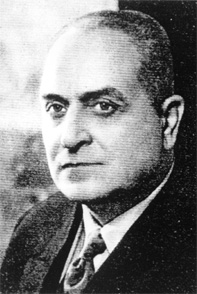| Profile | Major Works | Resources |
Gustavo Del Vecchio, 1883-1972

Italian monetary economist.
Gustavo del Vecchio was of Italian Jewish origin, hailing from the small town of Lugo in Romagna. After his father's murder by a business associate in 1888, his family moved to Bologna, where Gustavo del Vecchio attended local schools. Del Vecchio studied at La Sapienza in Rome (where he came under the influence of philosopher Antonio Labriola) and then at law faculty of the University of Bologna, from which he graduated in 1904, with a degree thesis on monopoly. In Bologna, he had come under the influence of the doctrinally classical economist Tullio Martello. He spent some time after as studying abroad in Berlin.
Gustavo del Vecchio developed a circulation theory of money, sometimes compared to Walras's lines, in a series of articles that appeared in the Giornale degli Economisti from 1909 to 1917, (later collected in his Ricerche, 1932).
After military service in WWI, Gustavo del Vecchio was appointed professor of political economy at Trieste in 1920. In 1926, he obtained an appointment in economics and public finance at the University of Bologna. In 1930, he also became rector of Bocconi University in Milan. Del Vecchio was forced to resign from his academic positions in 1938 on account of the introduction of racial laws by the fascist regime. For a while, Del Vecchio worked as a freelance teacher of Jewish youngsters barred from formal schools. Upon the German invasion in 1943, Del Vecchio fled to Switzerland, living in a refugee camp until 1945, when he returned to Italy and recovered his position at Bologna. He worked for a while with the new Italian government to assist in the recovery from the war, and was partly responsible for the controversial 1947 monetary contraction under Einaudi to put a brake on post-war inflation. In 1948, he left Bologna to become the governor of the International Monetary Fund (IMF) in Washington DC, where he served for two years, then took up an appointment at La Sapienza in Rome, where he remained until his retirement in 1958..
|
Major Works of Gustavo del Vecchio
|
|
HET
|
|
Resources on Gustavo del Vecchio
|
All rights reserved, Gonšalo L. Fonseca
